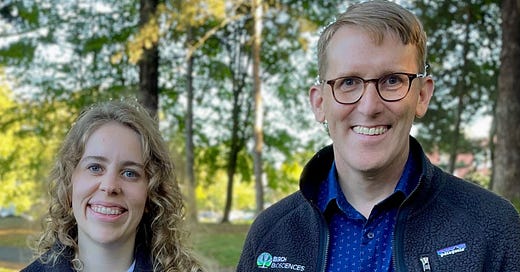This is CC Pod - the Climate Capital Podcast. You are receiving this because you have subscribed to our Substack. If you’d like to manage your Climate Capital Substack subscription, click here.
Disclaimer: For full disclosure, Birch Biosciences is a portfolio company at Climate Capital where Kirthika Padmanabhan works as a Principal.
CC Pod is not investment advice and is intended for informational and entertainment purposes only. You should do your own research and make your own independent decisions when considering any investment decision.
Catch our newest CC Pod episode where host Kirthika chats with Birch Biosciences co-founders Johan Kers and Emily Duncan. Hear how Birch Biosciences is driving solutions for plastic waste with advanced enzyme technology.
Plastic pollution is pervasive, harming ecosystems and human health alike. The traditional recycling process is fraught with challenges, primarily due to the poor economics of recycling plastics. Many plastics can only be recycled a few times before degrading in quality, leading to a linear system where materials are used once and discarded. This inefficiency not only contributes to the growing plastic waste crisis but also perpetuates reliance on fossil fuels for new plastic production, which is responsible for a significant percentage of greenhouse gas emissions.
Birch Biosciences is tackling these issues head-on with a mission to close the loop in plastic recycling. Their technology centers around the use of enzymes—biological catalysts that can break down plastic into its fundamental chemical building blocks. This process allows for the creation of 100% recycled plastic products that match the quality of virgin plastics derived from fossil fuels.
Johan and Emily describe their enzymes as "molecular scissors" that effectively sever the chemical bonds within plastic polymers. By doing so, they can recover the essential building blocks needed to re-polymerize these materials into new, high-quality plastic products. This infinite closed-loop process not only enhances recycling rates but also significantly reduces the environmental impact associated with plastic production.
Since its inception in 2021, Birch Biosciences has achieved several key milestones, including securing funding through SBIR grants and acceptance into Y Combinator. They have garnered significant interest from major plastic manufacturers, receiving letters of intent summing $80 million, indicating a strong market demand for their innovative solutions.
Looking ahead, Birch is focused on scaling their technology through the establishment of a pilot plant that will allow them to demonstrate their process on a commercial scale. Their current emphasis is on recycling PET plastics, commonly found in beverage bottles and food containers. However, they are also exploring the potential of breaking down other types of plastics, such as polyurethanes, which are prevalent in durable goods and textiles.
As the episode concluded, both Johan and Emily emphasized the importance of hope and collaboration in the fight against plastic pollution. They encourage listeners to remain engaged in sustainability efforts, whether by recycling, supporting innovative companies like Birch Biosciences, or simply staying informed about the challenges and solutions in the space.
In a world where plastic waste continues to grow, Birch Biosciences stands out as a beacon of innovation and resilience. Their commitment to creating a sustainable future through enzyme technology not only addresses the pressing issue of plastic waste but also inspires a collective movement towards a circular economy. As we look to the future, the advancements made by Birch and similar companies could very well redefine our relationship with plastic and pave the way for a cleaner, more sustainable planet.
For more insights into Birch Biosciences, visit https://www.birchbiosciences.com/.





















